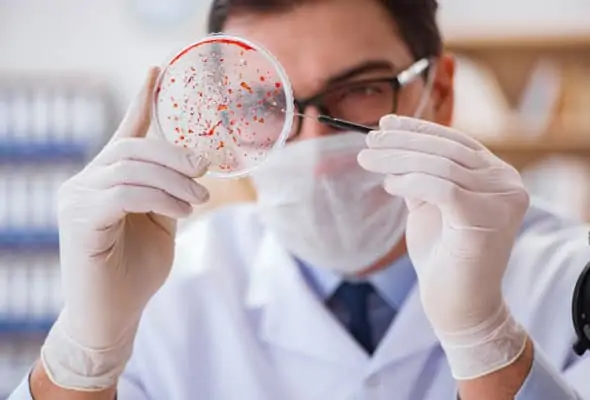EXPERTISE
Medical Device Microbiological Analyses
Microbiology Expertise
![]() Contamination of your medical device and/or your production facility can cause significant issues that not only impact your bottom line but can also harm users of your device. Partnering with one of our experienced professionals to develop a customized plan for the biological safety of your device will help you meet your production timelines while ensuring industry requirements are met.
Contamination of your medical device and/or your production facility can cause significant issues that not only impact your bottom line but can also harm users of your device. Partnering with one of our experienced professionals to develop a customized plan for the biological safety of your device will help you meet your production timelines while ensuring industry requirements are met.
Find out more about biocompatibility testing and other services manufacturers should consider ensuring the quality and safety of their medical devices.

Biocompatibility Testing
Patient safety is the motivation for all biocompatibility testing in the medical device industry. As medical devices become more innovative in design and materials, the necessity for manufacturers to consider biocompatibility of their device as early as possible into the design process, is vitally important. The highest-risk patient contacting components of your device will typically require cytotoxicity, sensitization, and irritation testing at a minimum. As noted above, the biological safety evaluation report is required, thus testing alone is no longer sufficient to demonstrate the device is suitable for its intended use.
Our microbiologists generate protocols and help you interpret the biocompatibility test results with respect to the use of your device to be documented in a report. We have established relationships with the premier testing laboratories and will help manage your work with the lab throughout the testing process.
Biological Safety Evaluation Reports
Medical devices intended for human use must be subjected to a comprehensive biological evaluation of a medical device, to be carried out and documented in the form of a biological safety evaluation report. To comply with the current ISO 10993 series of biocompatibility standards and regulators’ expectations, you are responsible for conducting a risk-based assessment of your device and generating an evaluation plan for demonstrating biocompatibility.
The industry standards and regulator guidance emphasize that these reports shall be conducted by knowledgeable and experienced professionals, such as our team of experienced microbiology consultants. Our experts can guide you through the risk assessment and identify the biological endpoints for consideration and the appropriate tests necessary to demonstrate your device’s biocompatibility.
Cleanroom Qualification
Cleanrooms are widely used to meet the requirements for a controlled environment in medical device production. Qualification of a cleanroom starts with determining the appropriate cleanroom classification based upon the criticality of the affected device and the processes to be performed in the cleanroom. Cleanroom classifications are defined by the 16-part series of ISO 14644 standards that cover installation, operation, validation, monitoring, cleaning, and beyond.
Our consultants know how to navigate these standards to apply them to your device and will manage all or part of your qualification process, dependent on your preference.
Cleaning Validation
Cleaning processes are of great interest and focus to medical device regulators because of the direct impact contaminated devices may have on patient safety. Types of cleaning validations include validation of the final cleaning processes during production of a device, reprocessing validations for reusable devices and equipment cleaning process validations.
Cleaning validations for your product should be managed by professionals such as our microbiologists who have up to date knowledge of the evolving industry standards as well as an understanding of industry practices and available test methods to ensure success.
Sterilization Validation
While sterilization validations are fairly standardized, it is a critical process that requires specific documentation, guidance and approval by qualified professionals. To demonstrate a device is sterile, you must first select a suitable sterilization process for your device and its packaging such as steam, ethylene oxide (EO), and gamma radiation. The next step is to conduct validation of the process that requires conducting testing to demonstrate the appropriate sterility assurance level is delivered to your devices. Process validation is conducted in accordance with the appropriate standards, such as ISO 17665, ISO 11135, and ISO 11137 series.
Our experienced microbiologists can assist with selecting an appropriate sterilization process, ensuring that your sterilization method is appropriate for your medical device and that your validation is comprehensive and complies with international standards and regulatory guidance. We will assist you where you need us whether it be part or all of sterilization process selection, contractors, laboratory management, test method development, and protocol/report generation.
Learn more about the latest EO sterilization validation requirements.
Monitoring Plans for Endotoxins and Bioburden
Bacterial endotoxin testing is required for sterile implantable devices and devices that have direct or indirect intravascular, intralymphatic, intrathecal, and/or intraocular contact. The term “bioburden” refers to the number of viable microorganisms present on or in a product and is routinely conducted on devices prior to sterilization. Once the need for routine testing is established, internal procedures in compliance with ANSI/AAMI ST72:2019 and ISO 11737-1 should be established. Devices with consistent, acceptable test results over an uninterrupted period of time may be eligible for reduced monitoring provided the appropriate validation has been conducted.
Our knowledgeable experts will help you determine the appropriate testing schedule for routine bioburden and bacterial endotoxin testing for your new and established devices.




